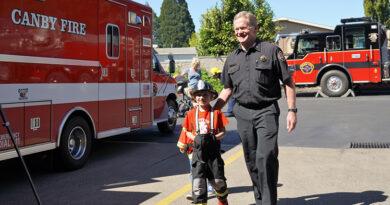Professor Brings Passion to Literary Arts
Fishing for Stories
People: Dr. Henry Hughes
By Donovan Darling, Staff Writer

Dr. Henry Hughes, professor of literature and writing at Western Oregon University, has a pure passion for what he teaches — writing, literature, nature, and adventure. Perhaps more importantly, he’s deeply passionate about the oldest human art form — storytelling. “We always need our society to tell, write, sing, and appreciate our stories,” Hughes said.
For Dr. Hughes, reading and teaching began at an early age. “I was always happy to talk about books, whether people wanted to hear it or not,” Hughes said jokingly. “My main job is helping unpack — some people say mediating, making accessible — a text, a piece of literature,” which he said can be challenging, especially with poetry. When students find meaning in a piece of literature, Dr. Hughes is truly energized. “That’s very exciting to me,” he said.
His passion extends beyond the classroom, however. “I think my impact on the community is to raise consciousness about the importance of the literary arts,” Hughes said. Dr. Hughes is a strong supporter of the fine arts, including painting, sculpture, and film. And he’s not shy about sharing his own art. “I like the role of being public about my experiences and seeking knowledge,” Hughes said. He discussed his recent expedition to Antarctica and how knowledge is very much derived from experience and should be shared. “That’s my role — to get out into the world and learn things, do things, and then bring that back and get people excited,” Hughes said. He’s also not shy about his other great passion — fishing. “There’s mystery, it’s dark, it’s a different, alien kind of universe. And you drop this thin line down there with some bait or a lure and you get a response, you get a signal from some strange, primitive, wonderful creature.” Fishing, as Hughes implied, is a great metaphor for the search for knowledge.

When asked about the future of writing and literature, especially with technological advancement such as ChatGPT, Hughes said, “I think writing and literature will always have a place in our society.” He discussed how storytelling, unique to humans in all its curiosity and idiosyncrasy, is so important to our survival and happiness. “Cease not till death,” Hughes quotes Walt Whitman, one of his favorite poets. Hughes celebrates “travel, good food, good drink, friendships.” He said, “Just be engaged with the world.” In this age of digitalism and social upheaval, it seems Dr. Hughes would want us to believe that storytelling can keep us connected and may even make us happy.
If you’re interested in taking writing or literature classes with Dr. Hughes, visit www.wou.edu or stop by admissions for more details. Western Oregon University is located at 345 Monmouth Ave. N. in Monmouth.






